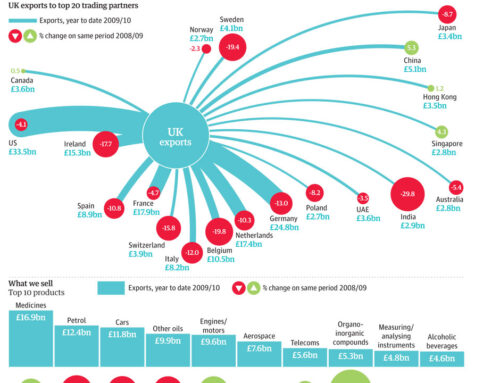For all previous webinar recordings, you can view them here OpenToExport.
Exporting essentials documentation
Open to Export conducted a webinar on export documentation on Thursday 21st February 2013.
The webinar (audio & slide show), hosted by Philip Montague of Open to Export, featured three presentations, followed by an interactive Q&A session. The presenters and topics are listed below.
- Mike Josypenko of The Institute of Export (IOE): Export Documentation
- Rebecca Cluer of DHL: International Shipping
- David Salter of RBS: Financial Documentation in International Trade
INTERNATIONAL TRADE COURSE
Open To Export:
Your community for going global.
Click here for more information.
Common Export Documents
Specific requirements vary by destination and product. It is divided into the following subsections: common export documents, transportation documents, export compliance documents, certificates of origin, other certificates for shipments of specific goods, other export-related documents, and temporary shipment documents.
COMMON EXPORT DOCUMENTS
A commercial invoice is a bill for the goods from the seller to the buyer. These invoices are often used by governments to determine the true value of goods when assessing customs duties. Governments that use the commercial invoice to control imports will often specify its form, content, number of copies, language to be used, and other characteristics.
Considerably more detailed and informative than a standard domestic packing list, an export packing list lists seller, buyer, shipper, invoice number, date of shipment, mode of transport, carrier, and itemizes quantity, description, the type of package, such as a box, crate, drum, or carton, the quantity of packages, total net and gross weight (in kilograms), package marks, and dimensions, if appropriate. Both commercial stationers and freight forwarders carry packing list forms. A packing list may serve as conforming document. It is not a substitute for a commercial invoice. In addition, U.S. and foreign customs officials may use the export packing list to check the cargo.
A pro forma invoice is an invoice prepared by the exporter before shipping the goods, informing the buyer of the goods to be sent, their value, and other key specifications. It also can be used as an offering of sale or price quotation.
TRANSPORTATION DOCUMENTS
Air freight shipments require airway bills. Airway bills are shipper-specific (i.e., USPS, Fed-Ex, UPS, DHL, etc.).
Bill of Lading
A bill of lading is a contract between the owner of the goods and the carrier (as with domestic shipments). For vessels, there are two types: a straight bill of lading, which is non-negotiable, and a negotiable or shipper’s order bill of lading. The latter can be bought, sold, or traded while the goods are in transit. The customer usually needs an original as proof of ownership to take possession of the goods.
EXPORT COMPLIANCE DOCUMENTS
Export Licenses
An export license is a government document that authorizes the export of specific goods in specific quantities to a particular destination. This document may be required for most or all exports to some countries or for other countries only under special circumstances.
CERTIFICATES OF ORGIN
The Certificate of Origin (CO) is required by some countries for all or only certain products. In many cases, a statement of origin printed on company letterhead will suffice. The exporter should verify whether a CO is required with the buyer and/or an experienced shipper/freight forwarder or the Trade Information Center.
Note: Some countries (i.e., numerous Middle Eastern countries) require that certificate of origin be notarized, certified by local chamber of commerce and legalized by the commercial section of the consulate of the destination country.
- Australia (CO samples)
- Bahrain (importer to check with Govt. of Bahrain on format/information)
- CAFTA-DR (Costa Rica, Dominican Republic, El Salvador, Guatemala, Honduras CO sample)
- Chile (CO sample)
- Israel (CO sample Note: The green form needs to be purchased from Vendor)
- Jordan (notarized generic certificate of origin required)
- Morocco (importer makes a claim on the basis of supporting evidence)
- NAFTA (CO sample and relevant videos)
- Singapore
- Peru (There is no prescribed format. However, specific information is required.
- Korea (There is no prescribed format. However, specific information is required.
OTHER CERTIFICATES FOR SHIPMENTS OF SPECIFIC GOODS
Additional certificates are needed for different purposes. Check with your importer freight forwarder.
ATA CARNET/Temporary shipment certificate
An ATA Carnet, a. k. a., “Merchandise Passport,” is a document that facilitates the temporary importation of products into foreign countries by eliminating tariffs and value-added taxes (VAT) or the posting of a security deposit normally required at the time of importation.
Certificate of Analysis:
A certificate of analysis can be required for seeds, grain, health foods, dietary supplements, fruits and vegetables, and pharmaceutical products.
Certificate of Free Sale
Certificate of free sale may be issued for biologics, food, drugs, medical devices and veterinary medicine.
Dangerous Goods Certificate
Exports submitted for handling by air carriers and air freight forwarders classified as dangerous goods need to be accompanied by the Shipper’s Declaration for Dangerous Goods required by the International Air Transport Association (IATA). The exporter is responsible for accuracy of the form and ensuring that requirements related to packaging, marking, and other required information by IATA have been met.
For shipment of dangerous goods it is critical to identify goods by proper name, comply with packaging and labeling requirements, which vary depending upon the type of product shipper and the country shipped to. More information on labeling/regulations is available from the International Air Transportation Association.
For ocean exports, hazardous material regulations are contained in the International Maritime Dangerous Goods regulations.
Fisheries Certificate
The National Marine Fisheries Service conducts inspections and analyses of fishery commodities for export.
Fumigation Certificate
The Fumigation Certificate provides evidence of the fumigation of exported goods (especially agricultural products, used clothing, etc.). This form assists in the quarantine clearance of any goods of plant or animal origin. The seller is typically required to fumigate the commodity at his or her expense a maximum of 15 days prior to loading.
Halal Certificate
Required by most countries in the Middle East, this certificate states that the fresh or frozen meat or poultry products were slaughtered in accordance with Islamic law. Certification by an appropriate chamber and legalization by the consulate of the destination country is usually required.
Health Certificate
For shipment of live animals and animal products (processed foodstuffs, poultry, meat, fish, seafood, dairy products, and eggs and egg products). Note: some countries require that health certificates be notarized or certified by a chamber and legalized by a consulate.
Ingredients Certificate
A certificate of ingredients may be requested for food products with labels that are inadequate or incomplete. The certificate may be issued by the manufacturer and must give a description of the product, contents, and percentage of each ingredient; chemical data; microbiological standards; storage instructions; shelf life; and date of manufacture. If animal fats are used, the certificate must state the type of fat used and that the product contains no pork, artificial pork flavor, or pork fat.
Inspection Certificate
Weight and Quality certificates should be provided in accordance with the relevant governing body regulations for loading at port and loading at source/mill site as appropriate. A certificate of origin certified by the local chamber of commerce at the load port and fumigation certificate are to be provided to the buyer. Costs of all inspection, as well as certificates/documents at the load port, are usually the responsibility of the seller. Independent inspection certificates may required in some instances.
Pre-Shipment Inspections
The governments of a number of countries have contracted with international inspection companies to verify the quantity, quality, and price of shipments imported into their countries. The purpose of such inspections is to ensure that the price charged by the exporter reflects the true value of the goods, to prevent substandard goods from entering the country, and to deflect attempts to avoid payment of customs duties. Requirements for pre-shipment inspection are normally spelled out in letter-of-credit or other documentary requirements. Inspections companies include Bureau Veritas, SGS and Intertek. Some countries require pre-shipment inspection certificates for shipments of used merchandise.
Insurance certificates are used to assure the consignee that insurance will cover the loss of or damage to the cargo during transit. These can be obtained from your freight forwarder or publishing house. Note: an airway bill can serve as an insurance certificate for a shipment by air. Some countries may require certification or notification.
Phytosanitary Certificate
All shipments of fresh fruits and vegetables, seeds, nuts, flour, rice, grains, lumber, plants, and plant materials require a federal phytosanitary certificate. The certificate must verify that the product is free from specified epidemics and/or agricultural diseases. Additional information and forms are available from Animal and Plant Health Inspection Service (APHIS).
Radiation Certificate
Some counties including Saudi Arabia may require this certificate for some plant and animal imports. The certificate states that the products are not contaminated by radioactivity.
Other (Product-Specific) Certificates
Shaving brushes and articles made of raw hair must be accompanied by a recognized official certificate showing the consignment to be free from anthrax germs. Used clothing requires a disinfection certificate. Grain requires a fumigation certificate, and grain and seeds require a certificate of weight. Many countries in the Middle East require special certificates for imports of animal fodder additives, livestock, pets, and horses.
Weight Certificate
A certificate of weight is a document issued by customs, certifying gross weight of the exported goods.
OTHER EXPORT-RELATED DOCUMENTS
Consular Invoice
Required in some countries, a consular invoice describes the shipment of goods and shows information such as the consignor, consignee, and value of the shipment. The cost for this documentation can be significant and should be discussed with the buyer.
Dock Receipt and Warehouse Receipt
A dock receipt and warehouse receipt are used to transfer accountability when the export item is moved by the domestic carrier to the port of embarkation and left with the ship line for export.
Import License
Import licenses are the responsibility of the importer and vary depending upon destination and product. However, including a copy of an import license with the rest of your documentation may in some cases help avoid problems with customs in the destination country.
ISPM 15 (Wood Packaging) Marking
The International Standards for Phytosanitary Measures Guidelines for Regulating Wood Packaging Material in International Trade (ISPM15) is one of several International Standards for Phytosanitary Measures adopted by the International Plant Protection Convention (IPPC). The IPPC is an international treaty to secure action to prevent the spread and introduction of pests of plants and plant products, and to promote appropriate measures for their control.
Shipper’s Letter of Instruction
The shipper’s letter of instruction is issued by the exporter to the forwarding agent and includes shipping instructions for air or ocean shipment.
————

International Trade Course: This course is designed to provide the learners, and those operating within International Trade, an opportunity to broaden their understanding of global trade issues, and to gain a clear understanding of the processes and practicalities of International Trade.




